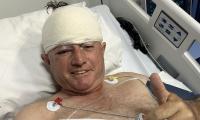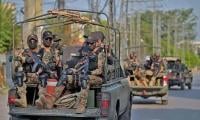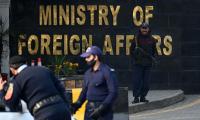HOUSTON: US Democratic presidential hopeful Bernie Sanders has said he is “deeply concerned” about the ongoing situation in Indian-occupied Kashmir and described as “unacceptable” the strict Indian lockdown that has brought life in the disputed Valley to a standstill for nearly four weeks.
“India’s action (in Kashmir) is unacceptable,” Sanders said while speaking at the Islamic Society of North America (ISNA) conference here on Saturday. US media reported that the Democratic contender broached a topic that has not gotten wide discussion in the 2020 field, with his criticism of India for recently revoking the autonomy of Kashmir earlier this month.
The Vermont senator also called for the communications in the disputed territory to be restored immediately. “The communications blockade must be lifted immediately, and the United States government must speak out boldly in support of international humanitarian law and in support of a UN-backed peaceful resolution that respects the will of the Kashmiri people,” Sanders said.
He also said the crackdown in the name of security was denying the people access to essential healthcare. “I am deeply concerned about this situation in Kashmir where the Indian government has revoked Kashmiri autonomy, cracked (down) on dissent and instituted a communications blackout.
“The crackdown in the name of ‘security’ is also denying the Kashmiri people access to medical care. Even many respected doctors in India have acknowledged that the Indian government-imposed restrictions on travel are threatening the life-saving care that patients need.”
Speaking at the same event via video link, Prime Minister Imran Khan urged the world to realise the serious threats posed to regional peace by the Hindu supremacist Rashtriya Swayamsevak Sangh (RSS), which has taken over India with a “mad ideology”.
Khan said the entirety of India was under the control of that extremist ideology, which was threatening the very fabric of Indian society, as all minorities were being systematically targeted. Pakistan, he said, was facing the RSS supremacist threat which had engulfed India, a nuclear-armed country with a population of over one billion people.
The dispute has put the two nuclear-armed countries face-to-face with each other after the Indian government’s unilateral and illegal action in occupied Jammu and Kashmir, Khan said. India, he warned, could stage a Pulwama-like incident to divert the world’s attention from its atrocities in Kashmir.
“It might resort to any misadventure or attack inside Pakistan to divert the international community’s attention from its gross human rights abuses, carnage and bloodshed in occupied Jammu and Kashmir,” he said. The Prime Minister cautioned the world to realise the consequences of such a conflict — which would not be like something happened in Rwanda or Bosnia as both the countries are nuclear armed and in case of any aggression, Pakistan will retaliate in a befitting manner.
To illustrate his point about RSS ideology influencing government policy, Khan referred to the recent development in India’s Assam region, where 1.9 million minorities, mostly Muslims, were being stripped of their nationality.
After Kashmiri Muslims, he said, Christians and the Sikh community would soon face such a scenario. “The RSS genie has come out of the bottle and will not return back,” he said, and expressed concerns for the future of the 200 million Muslims in India.
He said a former Indian home minister, in a public statement, had admitted that “RSS terrorists were trained in camps and it has about four million members”.
The Prime Minister urged the world and the West to understand that the RSS, which was established in 1925, is deeply inspired by the fascist and racist philosophies of Adolf Hitler and Benito Mussolini.
About Islam and the misconceptions leading to Islamophobia in the West, the Prime Minister said there was only one Islam and it was unfortunate to link any religion with terrorism. “The man on streets in the West should be sensitised to differentiate an entire religion from individual acts,” he said.
He noted with regret that after 9/11, every Muslim in the West was suspected and the term “Islamic terrorism” gave rise to Islamophobia. Prior to it, the Hindus and Japanese also blew themselves up, but no one blamed religion for that, he added. “Terrorism has nothing to do with religion,” he said, and urged the West to realise Muslims’ sentiments of love, affection and reverence they attached with their Holy Prophet (Peace Be Upon Him) and others.
The freedom of expression should not be used for sacrilegious purposes, he stressed. The Prime Minister noted it was that very Islamophobia that led to the attacks on Muslims in Europe, including the mosque attack in Christchurch.
This spectacle encouraged the Indian government to label the legitimate struggle for freedom like the ongoing one in Indian-occupied Kashmir as terrorism, he added. He urged the ISNA members to use their platform and accelerate their efforts to remove misconceptions in the Western world about Islam and the Muslims.
Khawar Manika's counsel continued his arguments on Wednesday in a petition filed by Imran Khan and Bushra Bibi
IHC reserved judgment on the petition against registration of cases against former interior minister Sheikh Rashid on...
Saudi woman who was reportedly kidnapped from Islamabad’s residential Sector F-8 in mysterious circumstances, has...
Pakistan Navy warship rescued 8 Iranian fishermen after their boat caught fire in the open sea
SC dismissed appeal against SHC order that turned down application of partner seeking extension of time to furnish...
Executive board of International Monetary Fund will meet on April 29 to discuss the approval of $1.1 billion funding...







